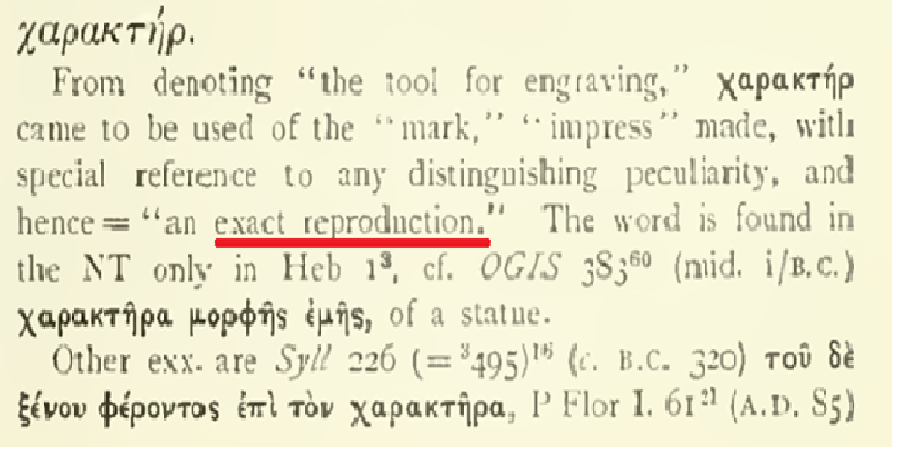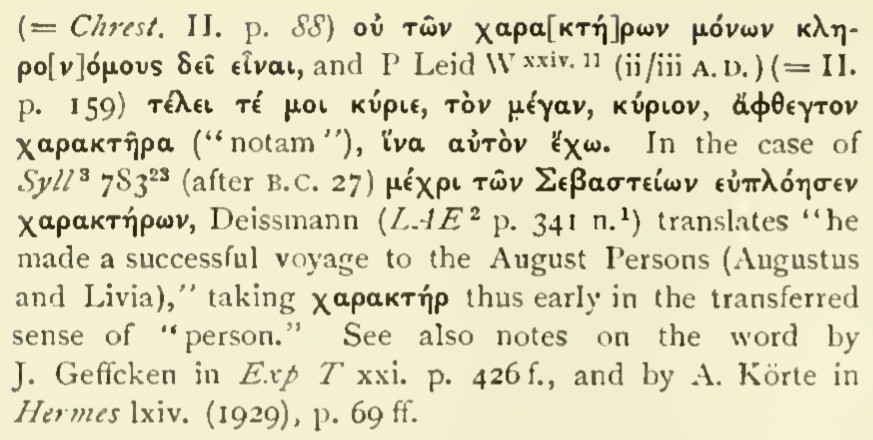Oeste
Well-Known Member
Similarly, YOU offered readers Milligans Syll 226 3.495.16 (of approx. 320 b.c.) the text says : “ Του δε ξενου φεροντος επι τον χαρακτηρα” .
Again, Milligan is not trying to apply a “present day” meaning to this word, but is demonstrating what the word mean in “320 b.c.). I do not think this example you gave us supports your claim regarding that Χαρακτηρ meant “exact representation”.
Will you explain why you gave this specific example and why you think it supports your claim?
YOU also offered P Flor I. 61.21 (of approx. 85 a.d.) the text Uses the word Character appears saying : “…ου των χαρακτηρων μονων κληρονομους δει ειναι”
Yet again, Milligan is not trying to apply a “present day” meaning to this word, but is demonstrating what the word mean in “approx. 85 a.d.)
I do not think this example you gave us supports your claim regarding that Χαρακτηρ meant “exact representation”.
Will you explain why you gave this specific example and why you think it supports your claim?
Here's my quote again:
No Clear, this is just flat out wrong and it shows us you either misunderstand or misread the papyri.
First, no one uses “exact Character” so I wouldn’t expect to see it in any papyri, lexicon or dictionary.
Second, when we read the published, peer reviewed works of actual, bona fide Greek scholars who looked at many of the very same papyri quoted above we see they reached a dramatically different conclusion.
Here is how James Hope Moulton, D.D., D. Theol., a Fellow of King’s College, Cambridge; Greenwod Professor of Hellenistic Greek and Indo European Philology, Manchester University and George Milligan, D.D., Regius Professor of Divinity and Biblical Criticism, Glasgow University saw it:


Source: The Vocabulary of the Greek Testament, Illustrated from the Payri and other non-literary sources, p. 683-684
As I stated before, there is NO DEBATE on whether χαρακτὴρ means “exact representation” at Hebrews 1:3.
Your argument that χαρακτὴρ did not mean “exact representation”, “exact impress”, or “exact reproduction” without “adding additional context” has been thoroughly refuted. This includes your argument concerning "historical text".
First, no one uses “exact Character” so I wouldn’t expect to see it in any papyri, lexicon or dictionary.
Second, when we read the published, peer reviewed works of actual, bona fide Greek scholars who looked at many of the very same papyri quoted above we see they reached a dramatically different conclusion.
Here is how James Hope Moulton, D.D., D. Theol., a Fellow of King’s College, Cambridge; Greenwod Professor of Hellenistic Greek and Indo European Philology, Manchester University and George Milligan, D.D., Regius Professor of Divinity and Biblical Criticism, Glasgow University saw it:


Source: The Vocabulary of the Greek Testament, Illustrated from the Payri and other non-literary sources, p. 683-684
As I stated before, there is NO DEBATE on whether χαρακτὴρ means “exact representation” at Hebrews 1:3.
Your argument that χαρακτὴρ did not mean “exact representation”, “exact impress”, or “exact reproduction” without “adding additional context” has been thoroughly refuted. This includes your argument concerning "historical text".
I even underlined the word "exact reproduction" to show where "exact" was being used by Milligan. Since Milligan is giving multiple definitions and multiple examples of these definitions, and since I have repeatedly and frequently stated that χαρακτὴρ means"exact representation" AT HEBREWS 1:3, and since I never separately quoted any of Milligan's extended examples, why would you conclude I was using Syll 783.23 or any other reference Milligan makes as and example of "exact representation"?
I am not seeing it Clear, so your claim is refuted. Please quote exactly where I stated Syll 783.23 means "exact reproduction".
